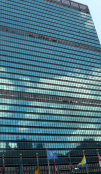Ambassador Skoog hosts the Presentation of the UN Secretary-General's Report on the Safety and Security of Humanitarian and UN Personnel

Introductory remarks by Ambassador Skoog
Dear Under-Secretary-General Gilles Michaud,
Excellencies, ladies and gentlemen,
It is my pleasure to welcome you here today on behalf of the European Union and to introduce USG Gilles Michaud of the UN Department for Safety and Security.
The number of humanitarian crises and their magnitude has grown exponentially. The latest data of the Global Humanitarian Overview estimates that overall, 168 million people across the world need humanitarian assistance and protection. Conflict, violence and persecution, climate change, continue to drive this suffering. Much of the suffering is also caused by widespread and systematic violations of international humanitarian law and disrespect for humanitarian principles. The results are growing food insecurity and mass displacement.
The unprecedented situation the world finds itself in due to the COVID-19 pandemic has a profound impact on existing global challenges, adding layers of complexity and volatility to the security landscape. It further exposes the underlying causes of insecurity, social and economic inequality and thus leads to increasing humanitarian needs.
https://twitter.com/EUatUN/status/1322209848956772354
The United Nations and humanitarian personnel responded to the pandemic with inspiring commitment. Despite this vital role, it was troubling to observe that the COVID-19 context resulted in additional adverse operational and security implications for their work, which further exacerbate existing impediments to relieving human suffering and even threaten the lives of humanitarian workers.
Aid workers have increasingly come under attack. Last year at least 125 aid workers were killed in the line of duty. The pandemic has exacerbated the global security environment, putting United Nations and humanitarian personnel at greater risk of insecurity and violence. The international community has both a moral duty and an obligation towards those who put their lives at risk in order to make a difference on the ground. Saving lives should not cost lives.
Humanitarian work depends on those who do it. Without humanitarian workers there no aid is possible. The equation is simple. But that simplicity conceals the most complex and difficult task today facing humanitarian organisations. That task is to access the people most in need, and often in hard to reach areas, while guaranteeing the safety of their personnel.
https://twitter.com/EUatUN/status/1322213136326369280
The protection of 180,000 personnel across the planet is an extremely daunting task; we all have to commend the work of UNDSS in this respect. We have to remember that we cannot have any impact on crises if humanitarian personnel are not empowered to deliver on their mission. The challenges are fierce but they can be overcome. It is key that we all strive to put into place a system that actively ensures the safety, warrants their status as essential workers and seeks accountability for threats and attacks against them.
The report of the Secretary General that USG Michaud is about to present gives us a straightforward, accurate picture of a complex issue and makes some pragmatic recommendations. I would like to draw your attention to some of its elements:
First, the figures indicate some worrying trends. There has been an increase in the absolute number of both UN and humanitarian aid personnel who have lost their lives in the line of duty as a result of violence. Attacks against UN premises and health care have also increased.
Every loss of life is tragic. Of course, the death toll could have been higher were it not for the collective efforts undertaken but precisely for this reason we must continue to address the risks collectively and more rigorously.
Second, non-governmental organisations and locally recruited personnel continue to be particularly vulnerable. The percent of fatalities amongst as well as attacks against locally recruited UN personnel have increased notably. Their security must remain a priority for all of us if we want them to continue to deliver their crucial mandate.
Third, accountability remains alarmingly low, contributing to the sense of impunity. National and International laws provide solid frameworks for the safety and security of UN and humanitarian personnel, but accountability lags behind. We have a collective responsibility to hold accountable those who put UN and humanitarian personnel at risk.
Humanitarian organisations are taking and will continue to take all possible measures to protect their staff and operations in these ever more difficult contexts by adapting their operational and risk mitigation strategies, and striving to abide by humanitarian principles. However, more can and must be done by the international community to strengthen the implementation of the international protection framework for all humanitarian workers. We all need to move from words to action to end impunity for attacks against humanitarians.
The EU and its 27 MS as facilitator of the annual resolution of the General Assembly on the safety and security of humanitarian and UN personnel is fully committed to advance this agenda.
And now, without further ado, let me pass the floor to USG Gilles Michaud to present the extremely valuable report of the SG on the Safety and Security of humanitarian personnel and the protection of UN personnel which his services have prepared.
Thank you.




